
The Cannes Film Festival was due to unveil the Official Selection for its 73rd edition in Paris today (April 16) until the Covid-19 pandemic forced it to cancel its scheduled May 12-23 dates and subsequently abandon plans for a new slot beginning end-June.
As of today, no new dates had been announced although the festival has said it is exploring other options to keep its work alive. Delegate general Thierry Frémaux has said that he and his selection team will continue to watch and assess submissions until early June.
But what then? Will the festival set a new date in the autumn or hook up with other events? If that’s not an option, will Frémaux announce his Official Selection regardless of whether it can be shown on the big screen? Or will he let go of the films that he and his selection committee have spent the year scouting, watching and reeling in? The latter course of action would be a deeply painful outcome for Frémaux.
Yesterday, parallel sidebars Cannes Critics’ Week, Directors’ Fortnight and ACID confirmed that they were cancelling their 2020 editions.
In this unprecedented chapter in the festival’s history, Screen has decided to go ahead with its annual ’Cannes: Who’s In The Running’ list. It is an opportunity to take stock of the productions that were hoping to get a shot at premiering in Official Selection or the sidebars and still need support to connect them to audiences around the world.
Given the ongoing global production hiatus, these are a selection of the prestige films that will now most likely be available to festivals for the rest of 2020 and, perhaps, even later on into 2021.
NORTH AMERICA
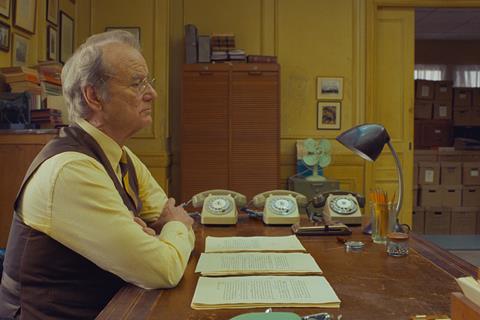
It was an open secret Wes Anderson’s The French Dispatch would debut in Official Selection. With its vast ensemble cast, led by Tilda Swinton, Timothée Chalamet, Saoirse Ronan, Léa Seydoux and Bill Murray, it promised to be one of the festival’s most exciting red carpets. Disney-owned Searchlight Pictures recently re-dated the film from July 24 to the prime fall festival and awards season slot of October 16.
Ana Lily Amirpour has been on festival radars throughout the early stage of her career and after The Bad Batch premiered in Venice four years ago, Cannes was plausible for her latest, Mona Lisa And The Blood Moon. The fantasy about a girl with special powers who heads to New Orleans stars Kate Hudson and Korean actor Jeon Jong-seo from Burning.
Chloe Zhao’s Nomadland, her follow-up to 2017 Directors’ Fortnight selection The Rider, stars Frances McDormand as a near penniless woman in her sixties who travels across the United States. The film was looking like a strong choice for Competition but was in post as the pandemic struck.
Heidi Ewing’s hybrid drama I Carry You With Me following the enduring love of two Mexican men against the odds was angling for an international premiere having debuted at Sundance to critical acclaim.
There was also strong buzz around Norwegian actress-filmmaker Mona Fastvold’s English-language drama The World To Come about two women who forge a close connection despite their isolation in the mid-19th-century American frontier. Casey Affleck produces, under his Sea Change Media banner, and co-stars alongside Katherine Waterston, Vanessa Kirby and Jesse Plemons.
Strong candidates for out-of-Competition slots included Pixar’s Soul and Paramount’s Top Gun: Maverick with Tom Cruise. Frémaux even went so far as to namecheck both in a recent interview. However, both films have been postponed now until the end of the year.
The current July 17 release date for Christopher Nolan’s Warner Bros action thriller Tenet would have worked with start-June, end-July. Nolan has never premiered a film in Cannes but is a staunch supporter of the big-screen experience.
UK AND IRELAND
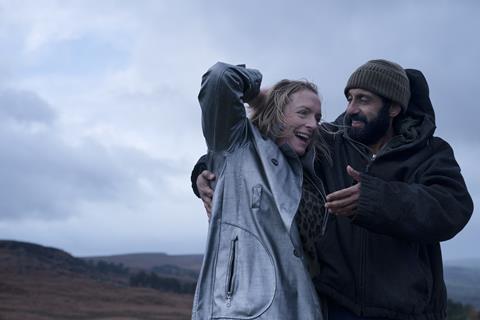
Expectations had been running high for Clio Barnard’s Bradford-set, star-crossed inter-racial lovers drama Ali & Ava, co-starring Claire Rushbrook and Adeel Akhtar. Barnard’s penultimate film The Selfish Giant premiered in Directors’ Fortnight in 2013 in spite of a rumoured, last-minute Official Selection invitation from Frémaux that year.
There had been hopes Joanna Hogg would make her Cannes debut in Competition this year with The Souvenir II, reuniting her with the cast of the original, Honor Swinton Byrne, Tilda Swinton and Ariane Labed.
Edgar Wright’s 1960s horror feature Last Night In Soho was understood to be perfect for a Midnight slot.
Andrea Arnold – a three-time Cannes Jury Prize winner with American Honey, Fish Tank and Red Road – was finishing artistic documentary Cow following the life cycle of a dairy cow, although it was not clear where, or if, it could sit in Official Selection.
Productions with parallel section potential included psychological horror drama Censor by writer/director Prano Bailey-Bond. Niamh Algar, whose credits include The Virtues and Calm With Horses, stars as a censor who stumbles on a video nasty that sets her on a quest to resolve her sister’s disappearance.
Censor is one a slew of promising first films from UK filmmakers in the final stages of post-production including Corinna Faith’s supernatural thriller The Power, set in a London hospital during the 1974 power outages; Stacey Gregg’s Belfast-set drama Here Before, starring Andrea Riseborough as a bereaved mother; Aleem Khan’s drama After Love starring Joanna Scanlan as a woman who discovers her late fiancé had a secret family in northern France; and Rebecca Hall’s racially-charged period drama Passing starring Ruth Negga and Tessa Thompson.
Further potential titles include Ben Sharrock’s sophomore feature Limbo about young refugees on a remote Scottish island waiting to be granted asylum, featuring Amir El-Masry and Sidse Babett Knudsen in the cast.
A number of upcoming UK features were believed to have set their sights on autumn festivals before the pandemic hit, including Harry MacQueen’s Lake District-set relationship drama Supernova, starring Colin Firth and Stanley Tucci, and Francis Lee’s romantic drama Ammonite, starring Kate Winslet as Victorian fossil hunter Mary Anning opposite Saoirse Ronan. It is Lee’s second feature after God’s Own Country.
NORDICS
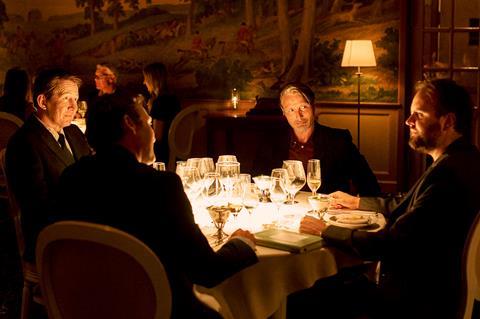
Denmark’s Thomas Vinterberg had been expected to take a third shot at the Palme d’Or with Another Round but sales company TrustNordisk has said the film is still in post-production and is scheduled for delivery in the third quarter of 2020. Vinterberg previously won the Cannes jury prize for The Celebration in 1998 and competed with The Hunt in 2012, for which Mikkelsen won best actor.
Also out of Denmark, Fredrik Louis Hviid and Anders Ølholm’s gritty police drama Shorta also held potential for a Cannes bow.
Anticipation had also been building around Norwegian director Eskil Vogt’s The Innocents, his second feature as a director after Sundance award-winner Blind. Vogt also co-wrote Joachim Trier’s 2015 Palme d’Or contender Louder Than Bombs and Oslo, August 31st which premiered in Un Certain Regard in 2011. The supernatural thriller is about a group of children aged from six to 12 who reveal their dark and mysterious powers when the adults aren’t looking.
Further Nordic hopefuls included Finnish-Iranian director Hamy Ramezan’s semi-autobiographical drama Any Day Now about a 13-year-old boy making a new life in a Finnish village whose world is turned upside down when his family is turned down for asylum. The film is produced by Aamu, the Helsinki-based production house behind 2016 Un Certain Regard selection The Happiest Day In The Life Of Olli Maki.
Swedish Cannes hopefuls included Sweat by Magnus Van Horn, whose debut feature The Here After impressed in Directors’ Fortnight in 2015. It revolves around an online celebrity fitness trainer looking for true intimacy away from the eyes of the social networks.
Ninja Thyberg makes her long-awaited feature directorial debut with Jessica, about a young Swedish woman navigating the porn industry of Los Angeles, which was also a hotly tipped title. Thyberg’s short Pleasure won a prize at Cannes Critics’ Week, and Cannes seemed a likely home for her adventurous debut.
Iceland’s Cannes hopes had been pinned on Lamb, a supernatural drama starring Noomi Rapace and Hilmir Snær Guðnason as as an Icelandic couple who adopt a newborn child that is half-human, half-sheep. First-time feature director Valdimar Jóhannsson co-wrote the script with acclaimed Icelandic author and poet Sjón.
Estonian filmmaker Veiko Ounpuu’s contemporary Nordic Western The Last Ones, set against the backdrop of Finnish Lapland, had also been submitted.
FRANCE
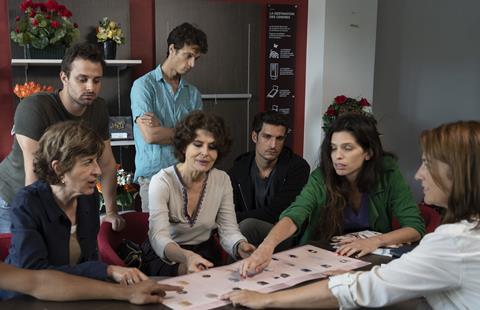
A slew of productions by Cannes habitués were coming together ahead of the pandemic.
These included Maïwenn’s semi-autobiographical drama DNA about a family riven by conflict which deepens when its elderly patriarch dies. The filmmaker and actress won the Cannes Jury Prize for Poliss in 2011 and was back in competition with My King in 2015.
Paul Verhoeven was in the final throes of post-production on French-language drama Benedetta, starring Virginie Efira as a controversial 17th-century Italian nun.
Further potential Palme d’Or contenders from France by Cannes regulars included Stephane Brizé’s For Better Or Worse, reuniting the director with Vincent Lindon in the role of a workaholic executive; François Ozon with the coming of age tale Summer Of 85; Bruno Dumont with On A Half Clear Morning, starring Léa Seydoux as a celebrity journalist trying to escape fame; and Laurent Cantet’s drama Author Rambo, about a rising young writer who comes under scrutiny when he is associated with an old hate-fuelled social media handle.
Leos Carax’s long-awaited Los Angeles-based musical romance Annette, co-starring Adam Driver and Marion Cotillard as a stand-up comedian and his opera singer wife, had not been expected to be ready in time for a Cannes debut, even prior to the pandemic.
French directors limbering up for a first shot at the Palme d’Or included Sylvie Verheydes with Madame Claude, about a real-life iconic Paris brothel owner, and Mia Hansen-Love with Bergman Island, starring Tim Roth and Vicky Krieps as a married screenwriting duo on a working holiday on Ingmar Bergman’s long-time home of the Swedish island of Faro. Both filmmakers previously premiered features in Un Certain Regard.
Respected screenwriter Emmanuel Carrère’s second film Between Two Worlds, starring Juliette Binoche as an investigative journalist who goes undercover as a cleaner to probe social precarity in the northern French port of Caen, had also been submitted. His debut feature The Moustache premiered in Directors’ Fortnight in 2005.
Another second film in the mix was Rachel Lang’s Our Men, a drama about the families of soldiers in the French Foreign Legion and how they cope during their absence while in action.
Potential Official Selection first-timers included Antonin Peretjatko with Old Fashioned (La Pièce Rapportée) about a well-heeled 48-year-old bachelor who upsets his snobby mother when he falls for and marries a metro worker. His film Rendez-vous Of Déja-Vu took Directors’ Fortnight by storm in 2013.
Other buzzy films included Arthur Harari’s Onoda – 10,000 Nights In The Jungle, about the true story of a Japanese soldier who refused to surrender at the end of World War Two, and Gaël Lépingle’s Atomic Summer about a group of former high-school friends caught up in the aftermath of an accident at a local nuclear power station.
First features with potential were Giovanni Aloï’s psychological drama The Third War, starring Anthony Bajon as a young army recruit patrolling the streets of Paris in the wake of the 2015 terror attacks; Yassine Qnia’s inner city tale A Brighter Tomorrow; Samir Guesmi’s social drama Ibrahim; My Best Part, the solo directorial debut of Nicolas Maury, who is best known internationally as one of the assistant characters in French hit show Call My Agent!; and Just Philipott’s genre drama The Swarm about a women who develops a strange relationship with the locusts she is breeding as a protein crop.
BENELUX
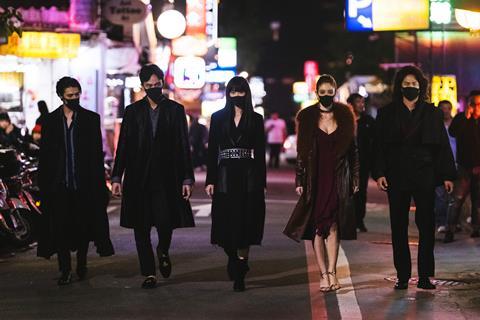
Flemish films knocking at doors of the parallel sections included Lieven Van Baelen’s Rookie, starring Veele Baetens, about an amateur motorcycle racer whose sporting ambitions are dashed when he has an accident; Anouk Fortunier’s father-daughter comedy My Dad Is A Sausage, in which a banker quits his job to pursue his love of acting; Jan Verheyen and Lien Willaert’s Save Sandra, about a couple who battle the pharma industry to save their sick daughter; and Eva Kuepper’s documentary Dark Rider about a blind motorcyclist.
Cannes hopefuls out of French-speaking Belgium included Lucas Belvaux’s Algerian War of Independence legacy drama Home Front, starring Gérard Depardieu and Catherine Frot, and Nabil Ben Yadir’s drama Praey (aka Animals), inspired by the real-life homophobic murder of a young Belgian-Moroccan man who was abducted from outside a night club in the Belgian city of Liege in 2012.
A final Belgian hopeful was the Outer Hebrides-set, English-language drama Wise Blood co-directed by French-speaking Belgian director Bouli Lanners and Flemish filmmaker Tim Mielants. Lanners stars as a man who loses his memory after a stroke and then strikes up a relationship with a colleague who claims they were once secret lovers. Lanners has premiered in Directors’ Fortnight twice with Eldorado in 2008 and The Giants in 2011.
Out of the Netherlands, David Verbeek’s long awaited Dead & Beautiful, about a group of super-rich and spoiled twenty-somethings who wake up after a night of wild partying to discover they have turned into vampires, had been submitted.
GERMANY & AUSTRIA
German hopefuls include Franka Potente’s English-language, US-set drama Home starring Jake McLaughlin as a recently released convict trying to reclaim his place in society, opposite Kathy Bates. It is the debut feature of the actress who broke out internationally in Tom Tykwer’s Run Lola Run.
SOUTHERN EUROPE
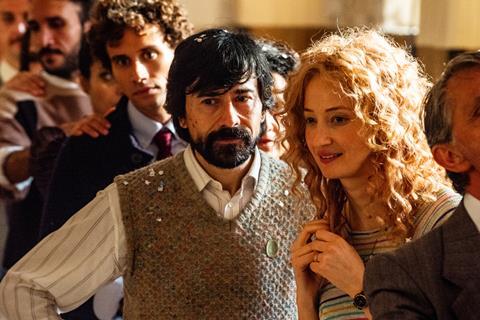
2020 could have been a strong year for Italy on the Croisette. There were hopes Nanni Moretti, who won the Palme d’Or for The Son’s Room in 2001, would be back in Cannes for an eighth time with Three Floors, a drama about the intertwined lives of people living on different floors of a Tel Aviv apartment block. Moretti was last at the festival in 2015 with Mia Madre.
Daniele Luchetti’s broken marriage drama The Ties, starring Alba Rohrwacher and Luigi Lo Cascio as a warring couple, had also been expected to be ready in time. Luchetti has competed twice before with The Yes Man (starring Moretti) in 1991 and Our Life (2010). In between, his 2007 family drama My Brother Is An Only Child played in Un Certain Regard.
Sergio Castellitto’s romantic drama A Bookshop In Paris, based on the last screenplay of the late Ettore Scola, was also nearing the end of post-production. Castellito stars as an antiquarian bookseller whose life is changed by the arrival of a lively young woman in his life, played by Bérénice Bejo. Castellito’s Fortunata (Lucky) and Don’t Move premiered in Un Certain Regard.
Sicilian director Emma Dante’s Palermo-set feature The Macaluso Sisters, about a group of tight-knit sisters whose lives are marked forever by the death of one of them in a tragic accident, was also in the running. Dante has never screened in Cannes; her last film A Street In Palermo debuted in Venice in 2013.
Jonas Carpignano’s third feature A Chiara, about a teenage girl in Calabria coping with the departure of her father in search of work, was another Competition hopeful. Carpignano’s first feature Mediterranea premiered in Critics’ Week and his second film A Ciambra debuted in Directors’ Fortnight.
Gianfranco Rosi’s Middle East documentary Nocturnal was in post-production when the pandemic hit but mystery swirls as ever around its completion date.
Further Italian films with parallel section potential included Italian-Iraqi director Haider Rashid’s drama Europa about an Iraqi man who falls prey to a group of vigilante immigrant hunters on Turkey’s border.
Buzzy titles out of Spain included Clara Roquet’s debut feature Libertad, a Costa Brava-set drama about the friendship between two teenage girls from different backgrounds. Roquet, whose short films include The Goodbye and The Good Girls, previously took a co-writing credit on Jaime Rosales’ Petra.
Another Spanish hopeful was cinematographer Pilar Palomero’s debut feature The Girls, a coming-of-age tale set against the backdrop of a convent school in Zaragoza.
Greek hopefuls included Jacqueline Lentzou’s drama Selene, 66 Questions about a woman who reconnects with her sick father when she discovers that he had a long-term secret lover. Lentzou won best short film with Hector Malt: The Last Day Of The Year in Cannes Critics’ Week in 2018. Gregoris Rentis’s hybrid, fly-on-the wall documentary To Sail Close To The Wind about a group of mercenaries guarding vessels from pirates was also generating buzz.
EASTERN & CENTRAL EUROPE
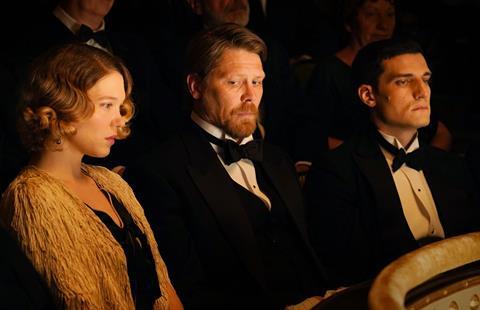
Hungarian director Ildiko Enyedi’s The Story Of My Wife held Cannes promise, in part thanks to its French cast members Léa Seydoux and Louis Garrel. The Cannes habitués star alongside Dutch actor Gijs Naber in this adaptation of Marin Fust’s eponymous 1942 literary classic about a Dutch sea captain obsessed with the idea that his flirtatious French wife has been unfaithful.
Enyedi, who won Berlin’s Golden Bear for On Body And Soul in 2017, last screened a film at Cannes some 30 years ago when she won the Caméra d’Or for My 20th Century.
Further Hungarian titles generating Cannes buzz included Dénes Nagy’s Second World War drama Natural Light, about a farmer, drafted into the Hungarian army serving in German-occupied Soviet territories, who is forced to take command when his superior is killed in action.
Out of Kosovo, Luàna Bajrami’s drama The Hill Where Lionesses Roar – about three bored teenagers who set up a heist gang targeting small businesses in their provincial home town – looked destined for a parallel section. It is the first feature for French-Kosovan actress Bajrami who is best known internationally for her performance as the servant girl in Céline Sciamma’s Portrait Of A Lady On Fire.
Romanian productions with potential included Andrei Gruzsniczki’s wry comedy drama Emil, a tale of friendship and love about a man who makes an unexpected discovery when his recently deceased wife starts haunting his best friend.
RUSSIA
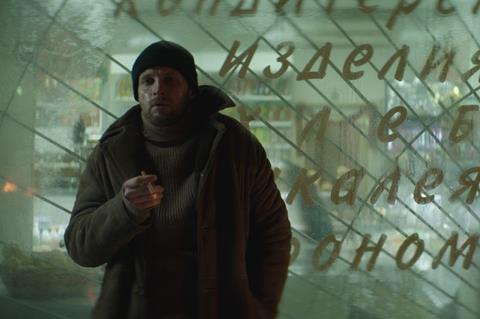
Kirill Serebrennikov’s Petrov’s Flu, following the surreal day of a seemingly ordinary family with extraordinary secrets as they battle a bad dose of the flu, had been racing to complete post-production as the Covid-19 pandemic hit. His last film Leto premiered in Competition in 2018.
Kira Kovalenko’s debut feature Unclenching The Fist about a young woman’s battle to break free from her over-controlling father in a mining town in the mountains was also being tipped for a potential Cannes splash. It is produced by Non-Stop Production, which has credits including Beanpole, Loveless and Leviathan.
MIDDLE EAST & NORTH AFRICA
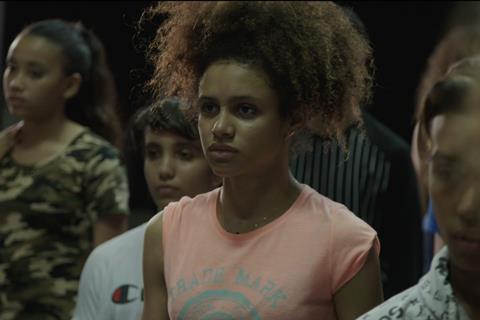
It was a potentially very strong year for the Middle East and North Africa.
Algerian hopefuls included French-Algerian director Kamir Aïnouz’s 1993-set drama Honey Cigar, revolving around the political awakening of a Paris-raised 17-year-old girl of Berber origin as her family’s country of origin is descending into civil war. The feature was developed with the support of Sundance’s Screenwriters Lab.
Out of Egypt, there was Mohamed Diab’s hotly tipped Palestine-set drama Amira inspired by the real-life phenomenon of Palestinian prisoners whose sperm is smuggled out of Israeli jails so their partners can conceive through artificial insemination. Diab’s post-revolution drama Clash opened Un Certain Regard in 2016.
Further Egyptian titles in the running included Ayten Amin’s Souad about a young woman’s investigation into the reasons behind her older sister’s suicide.
Buzzy Lebanese titles included Joana Hadjithomas and Khalil Joreige’s Memory Box, revolving around a woman living in Montreal who is transported back to her past in Beirut when she receives a box of old letters and photos out of the blue. The directorial duo were previously in Un Certain Regard in 2008 with I Want To See, starring Catherine Deneuve as an actress who visits Lebanon just as another war breaks out in the country.
Other Lebanese hopefuls include Bassem Breche’s The Maiden’s Pond about an independent-minded older woman who find herself unwillingly forced to protect her estranged daughter again, when she returns home, divorced, pregnant and broken.
Moroccan-French Cannes habitué Nabil Ayouch had submitted Casablanca Beats (previously announced as Positive School) revolving around youngsters in the city’s Sidi Moumen slum district participating in a cultural project encouraging them to express themselves through hip hop and music. Ayouch was previously in Cannes with Horses Of God in Un Certain Regard in 2012, while Much Love screened in Directors’ Fortnight in 2015.
Moroccan titles with parallel section potential included Ismaël el Iraki’s edgy drama Zanka Contact revolving around the relationship between a washed-up rock star and a prostitute.
Qatar-based Syrian directorial duo Rana Kazkaz and Anas Khalaf also had Cannes hopes for their thriller The Translator, about a political refugee who returns illegally to Syria in the early days of the 2011 popular uprising, to free his brother who has been jailed by the Assad regime.
There was also strong buzz around Tunisian director Kaouther Ben Hania’s drama The Man Who Sold His Skin about a Syrian refugee who agrees to have a Schengen visa tattooed onto his back as part of an art project. Ben Hania’s most ambitious feature to date stars Italy’s Monica Bellucci, Belgium’s Koen De Bouw and Tunisian actor Yahya Mahay. Ben Hania’s last film Beauty And The Dogs premiered in Un Certain Regard in 2017.
Other Tunisian hopefuls include Abdelhamid Bouchnak’s new genre film Golden Butterflies, in which a policeman with a violent past meets a small boy with whom he undertakes a fantastic journey. Bouchnak’s last film Dachra premiered in Venice Critics’ Week in 2018 and went on to tour genre festivals worldwide.
Tunisian filmmaker Leyla Bouzid’s Paris-set love story A Story Of Love And Desire, about a French student of Algerian origin who discovers erotic Arabic literature at the same time as he falls for a lively Tunisian student he meets at university, was also hotly tipped for a Cannes splash.
Iraqi-Kurdish filmmaker Hiner Saleem was also hoping to debut his upcoming drama Goodnight, Soldier about a young couple whose relationship is challenged when the husband is rendered impotent after being shot at the front.
Jordanian hopes had been pinned on Bassel Ghandour’s The Alleys, a farcical drama revolving around a young hustler who is trying to hide his secret relationship with a young college student, set against the backdrop a densely populated East Amman neighbourhood. Ghandour previously took co-writer credits on compatriot Naji Abu Nowar’s 2014 Oscar-nominated drama Theeb.
Palestinian filmmakers Arab and Tarzan Nasser were in the final stages of post-production on the Gaza-set romantic drama Apollo. The film is about a fisherman who pulls an ancient Greek statue out of the sea with interesting consequences for his love life. The brothers debut feature Degradé premiered in Critics’ Week In 2015.
ISRAEL

Buzzy Israeli titles included Nir Bergman’s drama Here We Are about a father who hits the road with his young adult, autistic son rather than commit him to a specialised home. It is a fifth feature for Bergman, whose debut feature Broken Wings premiered at Berlin in 2002.
Nadav Lapid semi-autobiographical feature Ahed’s Knee about a filmmaker battling an existential crisis at the same time as dealing with the death of his mother had been expected to be finished in time for Cannes.
Tom Shoval’s second film Shake Your Cares Away, starring Bérénice Bejo as a woman who decides to convert her luxury home into a refuge for the needy following the death of her multimillionaire husband, was also vying for a Cannes splash. His debut film debut Youth premiered in the Berlinale’s Panorama in 2013.
LATIN AMERICA
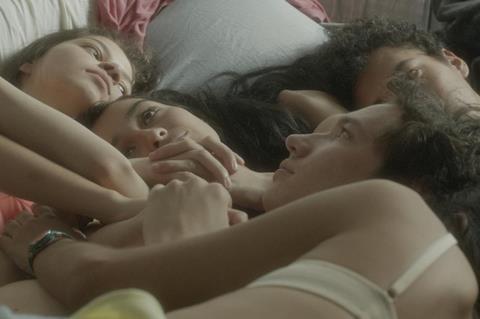
Potential titles from Argentina included Leonardo Brzezicki’s father-daughter drama Almost In Love starring Leonardo Sbaraglia, best known for Pain And Glory, Wild Tales and Wasp Network. Brzezicki’s debut feature Noche premiered at Rotterdam in 2013.
Further Argentinian titles being tipped included Alejandro Chomski’s adaptation of Paul Auster’s dystopian novel In The Country Of Last Things and Pablo Agüero’s 17th-century witch hunt drama Akelarre. Agüero’s first short Primera Nieve won a Cannes Festival jury prize in 2006, while his debut feature Salamandra screened in Directors’ Fortnight in 2008.
Argentine director Santiago Mitre’s French-language debut Petite Fleur, starring Daniel Hendler as an unemployed, unwitting house husband who kills his neighbour on a weekly loop, only to find him alive again the next day, was also hotly tipped. Mitre’s 2017 political thriller The Summit played in Un Certain Regard while his 2015 drama Paulina played in Critics’ Week.
Out of Brazil, João Paulo Miranda Maria’s debut Memory House, about a native man working on a dairy farm in a former Austrian colony in Brazil, could have been in the running for a parallel section slot. It was developed with the support of The Next Step initiative of Cannes Critics’ Week and the Cannes Cinéfondation residency in Paris.
There was strong buzz around Chilean director Rodrigo Sepulveda’s drama My Tender Matador (Tengo Miedo Torero), a long-gestating adaptation of late compatriot writer and activist Pedro Lemebel’s semi-autobiographical novel about a love affair between a middle-aged man and a leftist guerrilla fighter in the final year of Augusto Pinochet’s reign of terror.
Hotly tipped Colombian productions included Simón Mesa Soto’s Amparo about a single mother’s desperate efforts to keep her son from going to war. It marks Soto debut feature after his short Leidi won the Palme d’Or in Cannes 2014.
There was a strong crop of potential titles out of Mexico topped by Michel Franco’s The Dreams Of A Few, a dystopian tale of wealth disparity in Mexico City. Franco premiered his last film April’s Daughter in Un Certain Regard in 2017 and before that took aim at the Palme d’Or in 2015 with Chronic, winning best screenplay.
Compatriot Ernesto Contreras’s drama Cosas Imposibles, starring Nora Velázquez as a suppressed wife who strikes up an unlikely friendship with a drug dealer, was also seen as having Cannes potential. His 2017 film I Dream In Another Language premiered at Sundance.
Mexican-Salvadoran director Tatiana Huezo’s drama Night Of Fire about three girls and best friends growing up in a rural town marked by violence was also in the final throes of post-production.
Also out of Mexico, Rodrigo Plá’s drama The Other Tom (El otro Tom), about a single mother struggling to keep custody of her young son when she refuses to administer psychiatric medication after he is diagnosed with Attention Deficit Hyperactivity Disorder, was also in post-production. Plá’s second feature Desierto Adentro closed Cannes Critics’ Week in 2008.
There was also buzz around compatriot Carlos Armella’s comedy-drama Go Youth, revolving around the intertwined personal dramas of three teenagers growing up in Mexico City. The project was developed with the support of the Torino Film Lab, Impulso Morelia and also presented at the Cannes Atelier in 2017. It is Armella’s second feature after The Land Of Silence which debuted at Rotterdam.
Costa Rican director Paz Fábrega’s drama Restless (Desasosiego), about a woman in her 40s and a teenager who are thrown together by the latter’s unwanted pregnancy, also held parallel section promise. Fábrega’s third feature Cold Water Of The Sea won Rotterdam’s Tiger Award in 2010, while her second filmViaje premiered at Tribeca in 2015.
ASIA
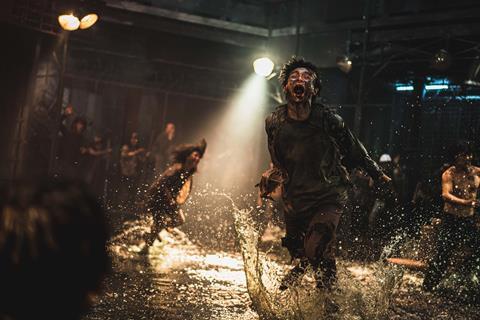
Riding high on the success of Bong Joon Ho’s Oscar-winning, Palme d’Or winner Parasite, Korean cinema could have expected to be in the spotlight at Cannes this year.
Buzzy titles being lined up out of the territory for a Cannes splash included Yeon Sang-ho’s Peninsula. The film is set in the same universe as his zombie thriller hit Train To Busan, which premiered as a Midnight Screening in 2016, but is not an official sequel according to the director. Yeon was also previously in Cannes with animation The King Of Pigs, which premiered in Directors’ Fortnight in 2012.
It was among a number of Korean titles with Midnight Screening potential including Byun Sung-hyun political drama Kingmaker, reuniting him with Seol Gyeong-gu (aka Sul Kyung-gu), the star of his crime thriller The Merciless, which premiered as a Midnight Screening in 2017. The cast also features Parasite star Lee Sun-kyun.
Hong Won-chan’s crime action drama Deliver Us From Evil, starring Hwang Jung-min (Veteran) and Lee Jung-jae (Assassination), was also in post. His film Office debuted in the midnight slot in 2015.
Im Sang-soo’s new film Heaven: To The Land Of Happiness was also in post. Choi Min-sik (Old Boy) and Park Hae-il (The Host) co-star as two men who set off on a journey in search of happiness. The director previously competed in Cannes with The Housemaid and The Taste Of Money in 2010 and 2012 respectively.
Other Korean titles nearing completion included Lee Joon-ik’s historical drama A Book Of Fish, also starring Seol and Byun Yo-han (Socialphobia), although it was not clear if it would have been to Cannes’ tastes.
Ryoo Seung-wan’s highly-anticipated action drama Mogadishu, about North and South Korean embassy diplomats forced to cooperate when civil war breaks out in Somalia, was not expected to be ready in time for a Cannes splash.
There had been hopes that Hong Kong filmmaker Ann Hui’s Love After Love would be submitted but it got stuck in post-production after the Covid-19 pandemic struck. It is an adaptation of Eileen Chang’s 1943 novella Aloeswood Incense about a young woman from Shanghai who heads to Hong Kong to continue her studies, but ends up working for her aunt, seducing rich and powerful men. Hui was last in Cannes with Boat People in 1983.
Septet: The Story Of Hong Kong – a omnibus of seven films by renowned Hong Kong directors Johnnie To, Hark Tsui, Hui, Patrick Tam, Sammo Hung, Wo Ping Yuen and the late Ringo Lam – had also been submitted.
Chinese titles with parallel section potential also originally included Wu Hai, the second feature from Inner Mongolia director Zhou after award-winning debut Old Beast. Set in the autonomous region of Inner Mongolia in Northern China, the crime drama revolves around a heavily indebted young entrepreneur, married to a woman from a wealthy background, who turns to desperate measures. The production would not now have been ready in time.
There was also strong buzz around Chinese-Austrian director and Michael Haneke protégé CB Yi’s debut feature Moneyboys, starring Taiwanese star Kai Ko as a young Chinese rent boy who sells his body to support his family.
From Japan, Cannes habitué Naomi Kawase’s adoption drama Three Mothers was also expected to be ready in time. Seven of her films have premiered in Cannes to date. She was there most recently with Radiance, which debuted in Competition in 2017.
Kiyoshi Kurosawa’s World War Two epic Wife Of A Spy was also nearing completion as the pandemic hit. Kurosawa, also a Cannes regular, was last in Official Selection with Before We Vanish, which played in Un Certain Regard in 2017.
From elsewhere in Asia, Thai filmmaker Apichatpong Weerasethakul, who won the Palme d’Or in 2010 for Uncle Boonmee Who Can Recall His Past Lives, was also believed to be close to completing post-production on his Colombia-shot, Mexico-backed English-language debut Memoria, starring Tilda Swinton.
There was also strong buzz around Vietnamese director Le Bao’s debut feature Taste, about an out-of-work Nigerian footballer who enters into an intense ménage-à-cinq with female middle-aged acquaintances for three days of communal living. Le Bao’s work has been described as being in the vein of Bi Gan and Weerasethakul.
Indian submissions included Prithvi Konanur’s urban thriller Where Is Pinki about a middle-class couple on a desperate search across the city of Bangalore for their eight-month baby after she is seemingly abducted by their housekeeper. It is Konanur’s third film after Waves, which premiered in Toronto in 2012, and Railway Children.






![The Brightest SunScreen[Courtesy HKIFF]](https://d1nslcd7m2225b.cloudfront.net/Pictures/274x183/3/5/0/1448350_thebrightestsunscreencourtesyhkiff_312678.jpg)


















No comments yet